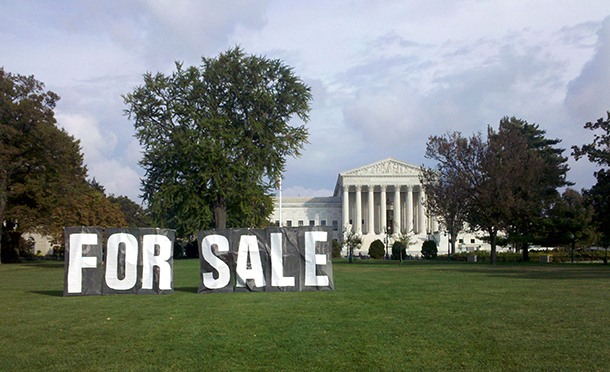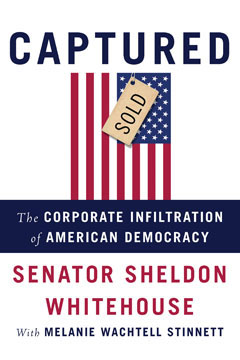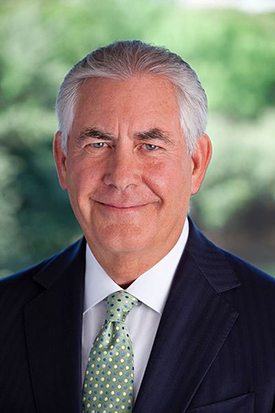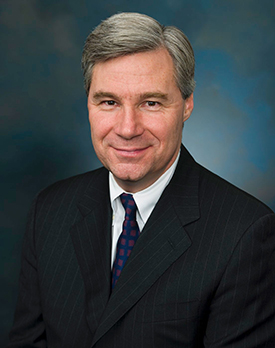Corporate Cash Derails Democracy
Air Date: Week of March 3, 2017

In 2010, Citizens United vs. Federal Elections Commission opened the door for corporate money and influence in US elections. Following the decision, opponents of the decision took to Washington D.C. in protest. (Photo: Takomabibelot, Flickr CC BY-NC-ND 2.0)
Critics warned the 2010 Supreme Court ruling in favor of Citizen’s United would unleash a flood of corporate cash. U.S. Senator Sheldon Whitehouse, Democrat of Rhode Island, believes that has happened and among other effects, has allowed the fossil fuel industry to derail climate discussions and policy-making. The Senator speaks with host Steve Curwood about his new book, “Captured: The Corporate Infiltration of American Democracy."
Transcript
CURWOOD: It’s Living on Earth, I’m Steve Curwood. When the US Supreme Court ruled in favor of the Citizen’s United claim that limits on corporate campaign contributions inhibit free speech, critics said the already heavy influence of money in politics was now freed to crush our democracy. Those critics include Senator Sheldon Whitehouse, Democrat of Rhode Island.
In his new book, “Captured: The Corporate Infiltration of American Democracy”, the Senator explores how big business has deflected and redirected important public programs, especially those attempting to protect the climate.
Senator Whitehouse, welcome to Living on Earth.
WHITEHOUSE: Thank you. Wonderful to be with you. Appreciate you having me on.
CURWOOD: Tell me, first, what is the corporate agenda, and whose views, specifically, does it reflect?
WHITEHOUSE: Well, my description of it is that it is an infrastructure that can be deployed on behalf of participating industries to offset or delay regulation and to impede legislation wherever a company's products end up creating any kind of public health risks or otherwise.
CURWOOD: What kind of risks build up? What are you talking about here?
WHITEHOUSE: One really, really obvious risk is simply the extent of carbon dioxide in the atmosphere and the climbing acidification of the seas. You can perhaps deny or try to explain the early stages of that, but at some point it becomes so physically obvious in the real, tangible world that there's no denying it any longer.
CURWOOD: In your new book, "Captured", you write that there's often a pattern to the strategies that fossil fuel companies take to challenge climate policy. I think you describe it as a “1-2-3 step. Deny the science. Question the motives, and exaggerate the costs.” When have you witnessed this process and why is it so effective in your view?

Senator Whitehouse’s book is “Captured: The Corporate Infiltration of American Democracy”. (Photo: The New Press)
WHITEHOUSE: Well, it's happened over and over again, and it's been at the heart of the climate change battle. Its general purpose is to create doubt in the public mind that proceeding to deal with the hazard would be a good thing. So, the first thing you do is, you deny the science or you put alternate science next to it to manufacture doubt. Then it helps to go after the other side as if it had a special interest, as if it had a conflict of interest, and that way the industry’s able to offset the fact that it IS a special interest that has THE conflict of interest, and then you can put a general kind of note of caution over the whole thing by suggesting to people that, if you fix this, it's actually going to cost a bucket of money, and it's going to cost jobs, and it's going to be really, really bad for everybody. So, until the science is settled, let's not rush into things.
CURWOOD: We talk a lot today about fake news. In your book you mention fake research in which fossil fuel companies pay consultants to write poorly scholarly articles supporting their interests. You also write that this concept of corporate sponsored research played a role in a case you brought against the lead paint industry as Rhode Island's Attorney General. Please tell us what happened in that case.
WHITEHOUSE: Rhode Island has a lot of old homes, painted back in an era when lead paint was common, and the result was that the number one public health threat to Rhode Island children was lead toxicity from lead paint ingestion. And so I decided that Rhode Island should bring an action against the lead paint industry. Well, the lead paint industry lawyered up phenomenally, and some of their plan was to hire people to write law review articles and then plant those articles, so that when the court got around to writing its decision, it would run the usual legal research tools to see who had written relevant stuff, and sure enough there would be the articles.
CURWOOD: What was the effect of that purchased research?
WHITEHOUSE: Well, unfortunately, in its decision, which threw out our jury verdict and turned the case to the defendants, the Rhode Island Supreme Court actually quoted some of that material. So it had an effect.
CURWOOD: The Citizens United Supreme Court ruling is the central focus of your new book. You quoted a defeated Congressman who in its aftermath described the court’s decision as the "polluters triumph". How did this ruling empower big polluters?
WHITEHOUSE: It allowed them to spend unlimited amounts of money. Before Citizens United even a very big polluter was very limited in what they could do to influence politics. But after Citizens United, they were able to put an entire architecture of new political artillery out, much of it firing from the shadows, dark money that you can’t identify the source of readily, and that changed the tone a lot in Washington. I saw in in the Senate, from 2007 to 2009, there was a lot of bipartisan activity on climate. 2010 comes Citizens United, from that month forward there was never another Republican-sponsored significant bill on carbon emissions.
CURWOOD: Now, you write that talking to Republican senators these days about climate change is a bit like talking to prisoners about escape. What do you mean by that, and what options do you think those Republican senators have these days?

U.S. Secretary of State Rex Tillerson previously served as the CEO of ExxonMobil. According to Senator Whitehouse, the company’s public position on climate change hasn’t always lined up with its actions in Congress. (Photo: Office of the President-elect, Wikimedia Commons CC BY 4.0)
WHITEHOUSE: Well, the point that I try to push back on is the notion that climate change is inherently a partisan issue. It's old-fashioned, smelly, special-interest, special pleading just like legislatures have known since the dawn of time. But what they have done, the fossil fuel industry, with this new Citizens United artillery is to focus on crushing any Republican who might have the temerity to start working on climate change. So, it has become politically impossible for Republicans to do that, but that doesn't mean that they don't want to do, that they wouldn't be interested in it if they could find a safe path. So, that's what I mean. It's like talking to a prisoner about escape, and at some point they get furtive, like you might talk to a prisoner about escape, and they look around to see, are the guards watching, is anybody listening?
The other interesting piece is that particularly with the new report by the three Republican former Treasury Secretaries supporting a carbon fee as a solution, there's actually quite good agreement on what the getaway car would like, if the prisoners could escape. Everybody kind of agrees that we will work with the Republicans on a carbon fee, if that's the way they want to solve this problem. But in between Republicans who are interested in doing this and the Republican-supported solution is this barbed wire fence with klieg lights and gun towers that the fossil fuel industry has put up that prevents any Republican from going.
CURWOOD: So, you're talking about the carbon dividend plan that former Treasury Secretary Jim Baker and George Schultz and Hank Paulson recently advanced, a carbon tax that would be rebated to everyone.
WHITEHOUSE: Yes.
CURWOOD: What do Republican senators say to you privately, out of earshot of the fossil fuel industry?
WHITEHOUSE: Well, I think the concern is that, is it politically survivable to make that move yet? And I don't think they're getting very strong signals that that is the case. Three treasury secretaries who no longer hold office don't really amount to hill of beans in the power politics of Washington. So, what I have urged is that it's really, really important that the rest of corporate America, many of whom have really good carbon policies, step up and take a real interest and go to Republican senators and say to them in a conversation that is meaningful, "We pledge to have your back. Come what may, we pledge to have your back."
CURWOOD: Any sign of that so far?
WHITEHOUSE: It's beginning to emerge. A considerable number of CEOs understand that this is a problem that they need to address. I think it'll happen.
CURWOOD: Now, you noted that in the 2016 presidential election, Hillary Clinton was more successful at attracting secret, that is, dark money and those really big donors than previous Democrats, and that that somehow gives you hope. Why?
WHITEHOUSE: I'm the prime sponsor of the Disclose Act which would shine spotlights into the dark money operations, and I was trying to recruit Republican co-sponsors, and one of the fellows I talked to said, "Well, you know, what you really need to do, Sheldon, is you need to raise a lot of dark money on your side because once it looks like it's going to be a tie, I think we'd be ready to get rid of the stuff. Everybody knows it's not good, but while we Republicans have a 5-to-1 or 8-to1 or 10-to-1 advantage in the dark money, why would we ever give away that advantage?" So, perhaps the use of dark money is evening, and that might give people an excuse to begin to turn against it, but ultimately I think it's going to be popular pressure, people just revolted by all this dark money floating around in the elections that will make the difference. I continue to believe that we can and will do this. I take a lot of heart from young voters who are really determined about this. Even young Republican voters are very strong in wanting action on climate. So, the island of denial that these political figures have to live on is getting smaller and smaller and smaller, and the fossil fuel industry at some point is going to be defeated.
CURWOOD: You note that, unlike most Republican presidential candidates in 2016, our new president hasn't always aligned with the fossil fuel industry on climate change. What degree of corporate influence in general and fossil fuel industry in particular can we expect from this new administration, and what sort of climate policy?
WHITEHOUSE: Well, that's going to be hard to tell. If they continue to trudge along the way they've trudged through the early months of being president-elect and then president, then we're not on a good trajectory at all. There are too many climate deniers in the White House. There're too many climate deniers in the Cabinet. However, if you go back to 2009, as you pointed out, President Trump once took out a full page ad in New York Times saying that climate science was irrefutable and the consequences of climate change would be catastrophic and irreversible, and he and his three children are all on record.

Ready for Hillary was a super PAC supporting the 2016 Clinton presidential campaign. Candidates are supposedly unaffiliated with super PACS, but the line separating the organization from the politician is often blurred. Hillary Clinton amassed more campaign financial support through super PACs in her 2016 bid than any other candidate
CURWOOD: Looking at the Trump administration, President Trump hired Rex Tillerson, the former CEO of America's largest fossil fuel company Exxon. In your view, what does that mean for the prospects of dealing with climate disruption by this administration?
WHITEHOUSE: Well, Secretary Tillerson has a horrible record from his private sector career. Exxon, for decades, covered up and hid and misled the public about the climate science that it not only knew, but was making investments based on, and now that he's Secretary of State, what one can hope for is that, in the same way that it took President Nixon to go to China because his anti-Communist bona fides were so great, maybe Tillerson can do something useful about climate change. Certainly up to the life he has lived up until now, he will not have much of an obituary if he doesn't. But the danger is that he will continue, true to proven form over many, many, many, many years, and serve the interests of the fossil fuel industry and continue to postpone any solution.
CURWOOD: Well, as you know, Senator, Exxon is now in the record favoring a carbon tax, but I think they also like the notion of indemnity for the fossil fuel companies if there is such a tax.
WHITEHOUSE: Well, you know, they say that they're on record for a climate change bill of some kind. They say that they understand that climate change is real. They say they'll accept a carbon fee, but in point of fact from my position in the Senate, every single piece of their political artillery is warning every person in the Senate, “Don't you dare.” Their entire political operation never budged and remains resolutely opposed to any type of climate fee, and I simply cannot believe that the CEO of the company doesn't know and didn't know what his entire political operation continued to do, notwithstanding the stated change in policy.
CURWOOD: Why do you care so much about the climate? Recently you famously were up at four in the morning in the Senate chamber doing a chemistry experiment to show how CO2 acidifies water.
WHITEHOUSE: Yes. Well, for starters I represent the ocean state, and Rhode Island has a long, long, long tradition of loving, enjoying, and working with the sea. We're also a small state, and when you look at the dangers of sea level rise we don't have lots of space to give back to the oceans. I also think that we’re being tested as a species. We have to figure out how to work together, how to trust science, and how to get this next challenge right.
CURWOOD: One could come away from your book, Senator, saying that the corporate influence on politics, particularly climate but in others as well, threatens the very existence of American democracy. How accurate is that view?
WHITEHOUSE: The worry that you express is at the heart of why I wrote the book. American democracy is making bad decisions because it has been occupied by this unprecedented corporate political power. And if the kickback against that by a dissatisfied and frustrated American public is against American democracy itself, then I think we are at risk of really damaging something that has been handed down to us over many generations, and it will be a tragedy because it will have been done in a misdiagnosis of the problem.

Senator Sheldon Whitehouse (D-RI). (Photo: United States Senate, Wikimedia Commons CC BY 4.0)
CURWOOD: Facts are important, but it's hard to use facts to change minds when emotions are so high. What's the human emotional connection to the threat of climate disruption that you think will be able to make the difference now in this fight?
WHITEHOUSE: There used to be a guy named Paul Harvey who did a radio show. At the end of it, he always said, "Stand by for the end of the story," and he'd come back on and then there would be some, like, twist in the story at the end that gave a whole new meaning to what had taken place before, and that reminds me, Americans like to know the whole story. This is not just a question of jobs versus polar bears. This is a question of a huge industry that has created an enormous array of front groups and shell corporations to pull a fast one on the American public. So, you really have to go, pull back the curtain, and show the American public the whole story. And I think, if they do, that's a plot twist that will get new interest in this. Nobody likes to have a big industry pull a fast one on them, and that's fundamentally what's happening here.
CURWOOD: So, as Paul Harvey would say, "Now, for the rest of the story."
WHITEHOUSE: "Now, for the rest of the story."
CURWOOD: Democrat Sheldon Whitehouse is US Senator from Rhode Island. His new book is called, "Captured: The Corporate Infiltration of American Democracy". Thanks so much, Senator, for taking the time today.
WHITEHOUSE: My pleasure. Thank you.
Links
Living on Earth wants to hear from you!
Living on Earth
62 Calef Highway, Suite 212
Lee, NH 03861
Telephone: 617-287-4121
E-mail: comments@loe.org
Newsletter [Click here]
Donate to Living on Earth!
Living on Earth is an independent media program and relies entirely on contributions from listeners and institutions supporting public service. Please donate now to preserve an independent environmental voice.
NewsletterLiving on Earth offers a weekly delivery of the show's rundown to your mailbox. Sign up for our newsletter today!
 Sailors For The Sea: Be the change you want to sea.
Sailors For The Sea: Be the change you want to sea.
 The Grantham Foundation for the Protection of the Environment: Committed to protecting and improving the health of the global environment.
The Grantham Foundation for the Protection of the Environment: Committed to protecting and improving the health of the global environment.
 Contribute to Living on Earth and receive, as our gift to you, an archival print of one of Mark Seth Lender's extraordinary wildlife photographs. Follow the link to see Mark's current collection of photographs.
Contribute to Living on Earth and receive, as our gift to you, an archival print of one of Mark Seth Lender's extraordinary wildlife photographs. Follow the link to see Mark's current collection of photographs.
 Buy a signed copy of Mark Seth Lender's book Smeagull the Seagull & support Living on Earth
Buy a signed copy of Mark Seth Lender's book Smeagull the Seagull & support Living on Earth

